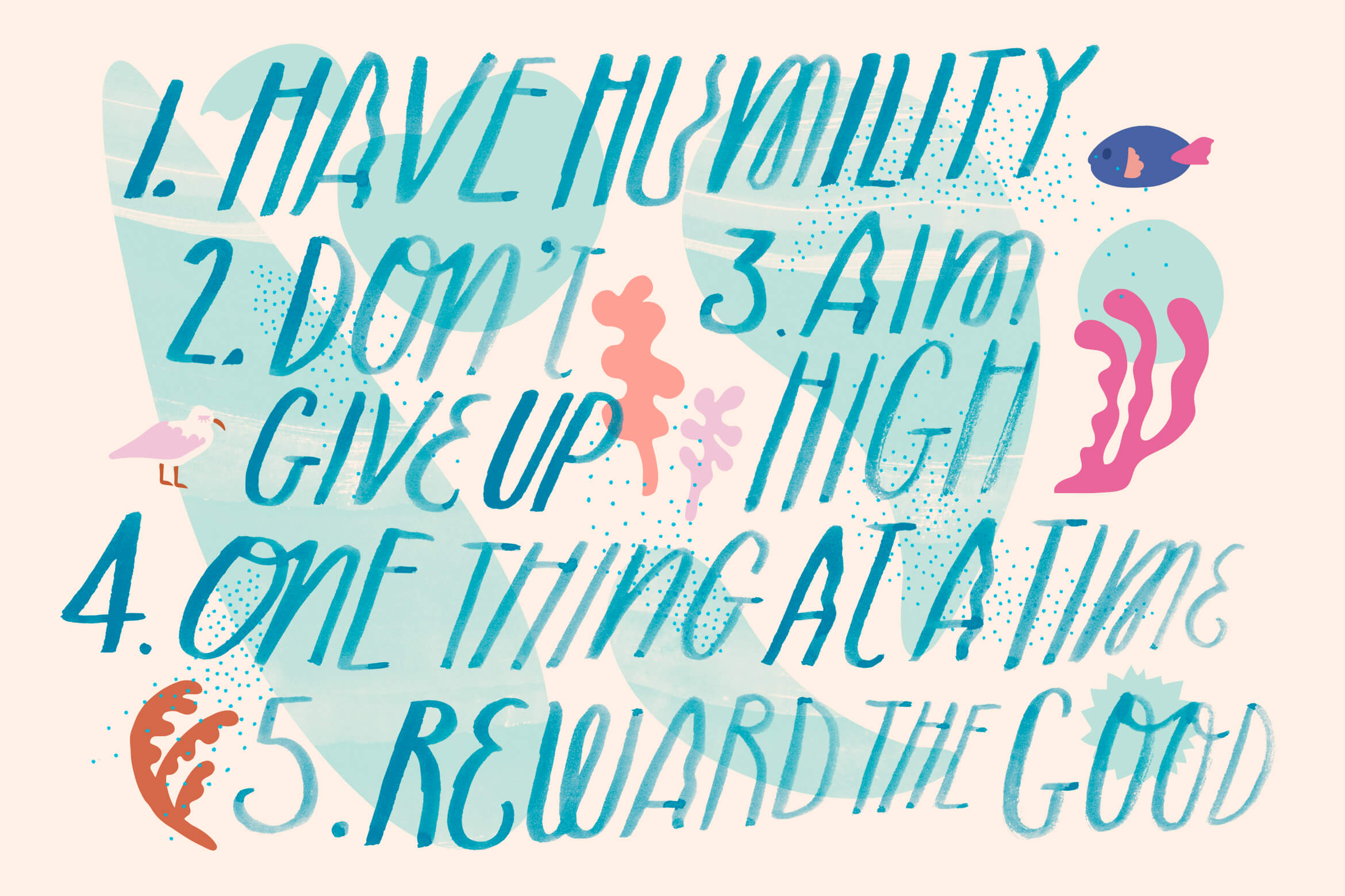Teaching kids to swim has taken me to surprising places in my life, and none more rewarding than learning the art of leadership. It’ll help you develop the soft skills companies and organisations are crying out for. Teaching kids the complex skill of swimming requires good communication, adaptability, creativity, problem-solving, and behavioural management.
Communication and confidence are skills that kids push you to develop because they’re a tough audience – they’re hard to win over, and will be distracted. You’re compelled to engage with them on their level and help them overcome their fears. If you can master a classroom in the water, those well-honed (and increasingly rare) soft skills will help you land your dream–gig! Although you may fall in love with the water, and want to stay, #lovemyjob!
Teaching kids has in turn, transformed my career into leading a team of incredible teachers. I'm constantly wondering how I can do better as a leader. I want to make people feel supported, and ensure they're capturing the vision I have for our community. Much like teaching the small to swim, good leadership comes down to communication, having confidence in your vision and giving people the time to learn and build their skills. Here I share some lessons on leadership I've learnt from two decades of teaching kids to swim…
1. Have the humility to keep learning.
Leadership begins with us leading ourselves. If you can carry yourself through life with curiosity, humility and grace and approach your work with a beginners mindset, and you're always in that space of learning and absorbing, you have the foundations of being a good leader. What does a leader do, but take you on a journey. I'm always looking for that quality in potential teachers; trusting of the way we approach the swimming journey and the humility and capacity to keep learning.
I like to think of both leadership and swimming being similar to the complexities of jazz – there's a lot of knowledge and technique to be mastered, but once you have those in your pocket, that's when the magic of creativity and freedom happens.
2. Don't give up.
I'm met with resistance when we reassess a progression in the program and decide to make a change. It's generally because the kids aren't given enough space to learn something new. I see some teachers after two sessions wanting to revert their lesson plan. But, when the resistance arises, it's my natural instinct to refuse to give up. Maybe it's a Gen X trait, like no, I'm gonna prove you wrong?! But it's also about keeping the faith and seeing a vision through. After three to four sessions, all of a sudden we hit a breakthrough with kids we're teaching the change to. It reminds me to never give up on your people. I would encourage you to persevere, because you'll get the gold if you do.
I've seen kids who are the worst kickers in the world. Their legs are like little washing machines, whirling around all crazy. And then two years later, after employing our technique "tickle toes" they're absolutely beautiful at kicking. Kids need time to grasp what they're learning and little steps of repetition.
A little love swims a long way. And isn't that true of all of us, no matter where we are in our journey?
I've also had shy, introverted team members who blossom into their roles and become successful team leaders. Empowering others can lead them to where they never thought they could go, and how beautiful is that! Just keep swimming!
3. Set your standards high.
I've found that if I focus on the strongest swimmer in my class, the weaker swimmers will step up. I'm not sure if there's something to that – perhaps it's inherently human nature. We want to be the best we can, and we do this by witnessing what's possible.
Weaker students can see what it looks like to do something well. They'll set about meeting the standard, even if it takes them a little longer. It's the same in leadership.
4. One thing at a time.
Much like the progressions we teach in our lessons, my leadership approach to onboarding new teachers is to bit by bit, guide them into their role. We want kids to become independent in swimming a whole lap of the pool. Eventually they'll be able to do this autonomously without instructions. But we don't want to overwhelm them by trying to teach them the complexities of kicking, buoyancy, breathing, movement all at once. This is bound to make kids feel disempowered.
Our program is structured around doing these things step by step which leads to far more relaxed and graceful swimmers. One thing at a time empowers teachers to get great results, using great tools and knowledge we lead them to. Teaching our teachers this way means they become better leaders for the kids they teach, too.
5. Reward what you want, ignore what you don't.
One of the toughest parts of being a teacher is behaviour management. In a perfect world, every child will listen and do exactly what they're asked to do. This is one of those leadership skills we learn and develop because disruptive behaviour can derail a class. Being a successful leader means creating a calm and in control environment.
The majority of behaviour issues we see in our lessons stem from young kids who're wanting your attention. In my lessons I've found it best not to give it to them. If however, they do something incredible in the lesson, I'll go over the top in celebrating what they did. I'll shower them in attention, signalling that good behaviour goes a long way. And kids light up.
In the past I've become frustrated with team members, and have tended to focus on all the little things they're doing wrong. But now – and it's always something I need to be aware of – I try to remind myself that when I focus on what the kids do well, they do more of that. The same approach works successfully leading my teachers.
Make sure when a team member does something really great, to reward them with encouragement, high fives and gratitude. Getting frustrated just drags everyone down. It's a lesson in empathy and patience. You can get the best from people if you set boundaries and celebrate the actions you want and let go of those you don't.
Being a leader has stretched me beyond anything I could imagine.
What has helped me to become effective is the valuable insights and soft-skills I've learnt from teaching kids to swim. It’s an incredibly rewarding role, empowering a child to overcome their fears, so they can find joy and ease in the water. If you’re looking for work that will all but guarantee self-growth, head to our careers page and consider applying.
Stay tuna-ed for next month's follow up, where I share even more leadership lessons from the pool!
Sea you in the water!
x Sasha



No comments.